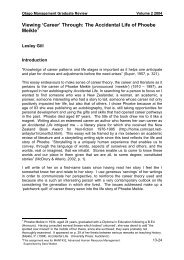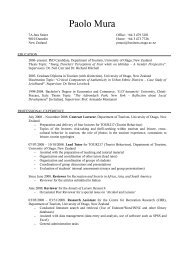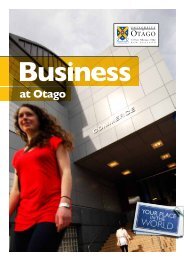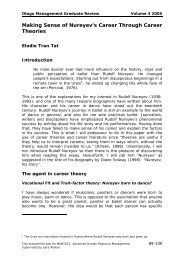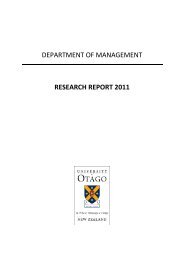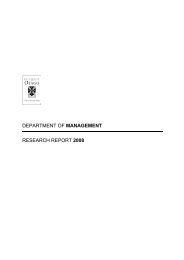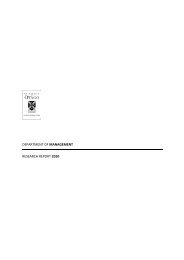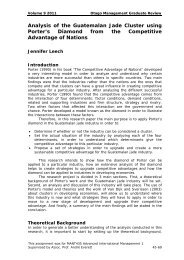department of management research report 2009 - School of ...
department of management research report 2009 - School of ...
department of management research report 2009 - School of ...
Create successful ePaper yourself
Turn your PDF publications into a flip-book with our unique Google optimized e-Paper software.
IAN MCANDREW<br />
RESEARCH INTERESTS<br />
Dr McAndrew's <strong>research</strong> interests lie in the areas <strong>of</strong> labour and employment relations,<br />
especially collective bargaining and workplace conflict resolution, and the mediation and<br />
adjudication <strong>of</strong> employment and industrial disputes.<br />
Ian has an active <strong>research</strong> collaboration with Management Department colleagues Alan<br />
Geare and Fiona Edgar, and a network <strong>of</strong> overseas collaborators, that ranges across human<br />
resources and industrial relations practices, employment and labour dispute resolution, and<br />
managerial values and ideologies.<br />
Ian’s long‐standing project on employment arbitration decisions, centred in the database <strong>of</strong><br />
some 12,000 Employment Tribunal decisions issued 1991 – 2003 has now been expanded to<br />
an international comparative study in collaboration with Pr<strong>of</strong>essors Michael Gurdon <strong>of</strong> the<br />
University <strong>of</strong> Vermont and Martin Risak <strong>of</strong> the University <strong>of</strong> Vienna. In addition, Ian is<br />
working on a major study <strong>of</strong> employment mediation in New Zealand with Pr<strong>of</strong>essor Risak<br />
who is a visiting scholar at the Otago University Management Department for that project<br />
throughout 2010.<br />
RESEARCH IN PROGRESS<br />
Justice in Employment: the Adjudication Decisions <strong>of</strong> the New Zealand Employment<br />
Tribunal. A database <strong>of</strong> Employment Tribunal adjudication decisions (and Employment<br />
Court judgments) has been under analysis at the Industrial Relations Research Centre <strong>of</strong> the<br />
Department <strong>of</strong> Management at the University <strong>of</strong> Otago since 1995.<br />
The variables captured for the database are in several categories: the issues involved in the<br />
case; characteristics <strong>of</strong> the parties, including gender, occupation, industry, and<br />
representation; characteristics <strong>of</strong> the Tribunal adjudicator, hearing and decision, including<br />
for example the gender <strong>of</strong> the adjudicator, location and length <strong>of</strong> the hearing, and length <strong>of</strong><br />
the decision; and various measures <strong>of</strong> the outcomes <strong>of</strong> the cases – who won, who lost, and<br />
the nature <strong>of</strong> remedies awarded, if any.<br />
Analysis <strong>of</strong> the database has now been extended to international collaboration with<br />
colleagues at the University <strong>of</strong> Vermont comparing arbitration decision processes and<br />
outcomes <strong>of</strong> the Vermont Labor Relations Board. Further international comparison is<br />
targeted for the Austrian Labour Courts.<br />
Facilitation <strong>of</strong> Collective Bargaining Disputes: the 2004 amendments to New Zealand labour<br />
market regulations authorised the Employment Relations Authority, an investigative and<br />
adjudicatory body, to ‘facilitate’ resolution <strong>of</strong> collective bargaining disputes that proved<br />
difficult or impossible <strong>of</strong> resolution by negotiation or mediation. A study into the nature<br />
and outcomes <strong>of</strong> this process, largely undefined in legislation, is continuing. An allied<br />
project is refreshing earlier work on the unique negotiation – mediation – adjudication<br />
49



